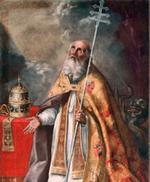Fathers of the Church
Epistle XVIII: to Peter the Subdeacon
by Gregory the Great in 590-604 | translated by James Barmby, D.d
Gregory to Peter, &c.
We have been informed that Marcellus of the Barutanian Church, who has had penance assigned him in the monastery of Saint Adrian in the same city of Panormus, not only is in want of food, but also suffers inconvenience from scarcity of clothing. Therefore we hold it necessary to enjoin your Activity by this present order to appoint for him as much as you may see to be needful in the way of food clothing and bedding for his own maintenance, and provision for his servant; so that his want and nakedness may be provided for with such timely care that what you assign to this same man may be reckoned afterwards to your own account. So act, therefore, that you may both fulfil our command, and also by ordering this very thing well you may be able yourself to partake of the profit of the same. Further, there is this other matter that we enjoin you to look to without regard to the old custom that has now grown up; namely, that if any cities in the province of Sicily, for their sins, are known to be without pastoral government through the lapses of their priests, you should see whether there be any worthy of the office of priesthood among the clergy of the churches themselves, or out of the monasteries, and, after first enquiring into the gravity of their behaviour, send them to us, that the flock of each place may not be found destitute for any length of time through the lapse of its pastor. But if you should discover any vacant place in which no one of the same church is found fitted for such a dignity, send us word after the like careful enquiry, that some one may be provided whom God may have judged worthy of such ordination. For it is not right that from the deviation of one the Lord's flock should be in danger of wandering abroad among precipices without a shepherd. For thus both the administration of places will go on, and there will remain no suspicion of the lapsed being restored to their former rank; and so may they repent the better.
Taken from "The Early Church Fathers and Other Works" originally published by Wm. B. Eerdmans Pub. Co. in English in Edinburgh, Scotland, beginning in 1867. (LNPF II/XII, Schaff and Wace). The digital version is by The Electronic Bible Society, P.O. Box 701356, Dallas, TX 75370, 214-407-WORD.






